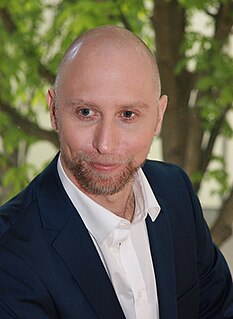James Dillon is a Scottish composer who is often regarded as belonging to the New Complexity school. Dillon studied art and design, linguistics, piano, acoustics, Indian rhythm, mathematics and computer music, but is self-taught in composition.
Ramon Lazkano is a contemporary Spanish Basque composer of classical music.
Harry Sparnaay was a noted Dutch bass clarinetist, composer, and teacher.
The Geneva International Music Competition is a music competitions held in Geneva, founded in 1939 in the Geneva Conservatory for a wide variety of instruments, voice, conducting, and chamber music.
The Gaudeamus Foundation and Contemporary Music Center organizes and promotes contemporary musical activities and concerts in the Netherlands and abroad. It focuses on supporting the career development of young composers and musicians, particularly Dutch, through its library facilities, contacts with international organizations, and its own activities. Gaudeamus was founded at Bilthoven, the Netherlands, in 1945 by Walter A. F. Maas, a Jewish immigrant from Mainz. It was originally headquartered in the Huize Gaudeamus, a villa built in the shape of a grand piano by the composer Julius Röntgen, also an immigrant from Germany but two generations older. Although in 2008 the Gaudeamus Foundation was incorporated into the Muziek Centrum Nederland, as from 2011 it continues to operate independently.
The International Rostrum of Composers (IRC) is an annual forum organized by the International Music Council that offers broadcasting representatives the opportunity to exchange and publicize pieces of contemporary classical music. It is funded by contributions from participating national radio networks.

Yuri Sergeyevich Kasparov is a Russian composer, music teacher and a professor at the Moscow Conservatory where he had studied for his doctorate under Edison Denisov. Under the patronage of Denisov, he founded the Moscow Contemporary Music Ensemble in 1990 and is its Artistic Director. He is the chairman of the Russian section of the International Society for Contemporary Music.
Jukka Tiensuu is a Finnish contemporary classical composer, harpsichordist, pianist and conductor.
Max Lifchitz is a classical pianist, composer, and conductor.
Jennifer Walshe is an Irish composer, vocalist and artist.
Zygmunt Krauze is a Polish composer of contemporary classical music, educator and pianist.
Hanna Kulenty is a Polish composer of contemporary classical music. Since 1992, she has worked and lived both in Warsaw (Poland) and in Arnhem (Netherlands).
Rebecca Saunders is a London-born composer who lives and works freelance in Berlin. In a 2017 Classic Voice poll of the greatest works of art music since 2000, the number of total votes received by Saunders compositions was the third highest (30), surpassed only by the works of Georg Friedrich Haas (49) and Simon Steen-Andersen (35).
Adriana Hölszky is a Romanian-born German music educator, composer and pianist who has been living in Germany since 1976.
Hiroyuki Yamamoto is a contemporary Japanese composer.
Madeleine Isaksson is a Swedish/French composer.
Nicholas (Nick) Casswell is an English composer specializing in chamber music.

Mariano Etkin (1943–2016) was an Argentine composer.

Eres Holz, is an Israeli composer who is resident in Germany since 2003.

The Deutscher Musikwettbewerb is a national music competition in Germany for classical soloists and chamber music ensembles held annually by the Deutscher Musikrat. It was first held in 1975 and is considered the most important competition for young musicians in Germany. The instrumental categories vary, and an extra prize is given for compositions. In even years the competition takes place in Bonn, where the Musikrat is based, and in the other years in a different German town.